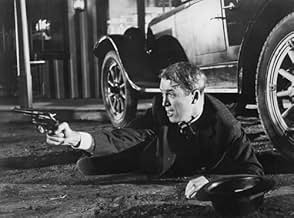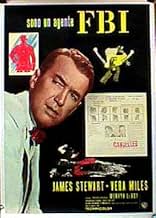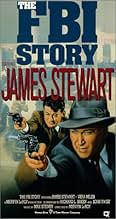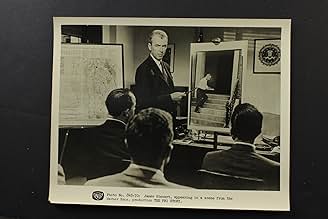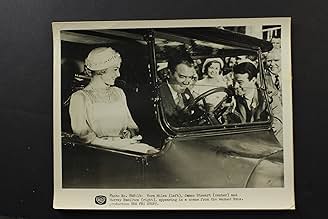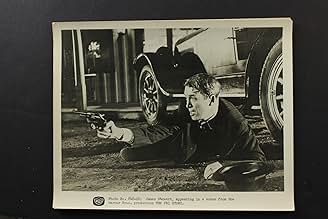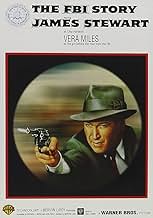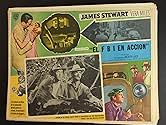AVALIAÇÃO DA IMDb
6,5/10
4,1 mil
SUA AVALIAÇÃO
Um agente dedicado do FBI recorda as batalhas da agência contra o Klan, o crime organizado e espiões comunistas.Um agente dedicado do FBI recorda as batalhas da agência contra o Klan, o crime organizado e espiões comunistas.Um agente dedicado do FBI recorda as batalhas da agência contra o Klan, o crime organizado e espiões comunistas.
- Direção
- Roteiristas
- Artistas
- Prêmios
- 1 indicação no total
Ken Mayer
- Casket Salesman
- (as Kenneth Mayer)
Victor Adamson
- Train Passenger
- (não creditado)
Luana Anders
- Mrs. Graham
- (não creditado)
- Direção
- Roteiristas
- Elenco e equipe completos
- Produção, bilheteria e muito mais no IMDbPro
Avaliações em destaque
This starts almost like a high school educational film about the FBI. The narration is actually veteran agent Chip Hardesty (James Stewart) doing a lecture. He recounts the story of the FBI starting from its early haphazard days in 1924. He marries pretty librarian Lucy Ann Ballard (Vera Miles). Over the years, he investigates the Ku Klux Klan, the Osage Indian murders, various gangsters, Nazis in Brazil, and communist spies.
This is a sympathetic look at the FBI approved by Hoover. The opening is like a school educational film which is par for the course. It's an old fashion take on the federal police force. It definitely doesn't indulge in any controversies against the FBI. There may violence by the KKK but there is no mentions of lynching. They round up enemy aliens during WWII but they don't talk about the thousands of innocent citizens in internment camps. It's also episodic in nature. The plot doesn't flow as much as it continues on and on. This is definitely a movie where Hollywood submits to authority.
This is a sympathetic look at the FBI approved by Hoover. The opening is like a school educational film which is par for the course. It's an old fashion take on the federal police force. It definitely doesn't indulge in any controversies against the FBI. There may violence by the KKK but there is no mentions of lynching. They round up enemy aliens during WWII but they don't talk about the thousands of innocent citizens in internment camps. It's also episodic in nature. The plot doesn't flow as much as it continues on and on. This is definitely a movie where Hollywood submits to authority.
Entertaining docudrama about the history of the FBI, as told by one agent in particular named Chip (James Stewart). Yes, it's more fiction than fact but it's also a good movie. Judging by some of the reviews here, most of the people hating on the movie seem to be political ax grinders. Obviously J. Edgar Hoover had a hands-on part in the making of this film. He inspires Jimmy to stick with the FBI in an amusingly corny scene. But I'm judging the movie on an entertainment basis, first and foremost, and this movie is entertaining.
The FBI parts are great. The parts dealing with Jimmy's domestic life not so much. Vera Miles is very attractive as a blonde and plays the clichéd but likable wife role well. It's just this part of the movie isn't that interesting and takes up too much time in a movie that goes on for over two hours. Murray Hamilton is good as Jimmy's partner ("I never want to cool off! NEVER!"). If your blood boils about J. Edgar Hoover or you demand absolute historical accuracy from any film depicting real people and events, you'll hate this. But if you like Jimmy Stewart, you'll certainly find things to enjoy here. He's really the whole show. Whether he's taking on the KKK, gangsters, and Commies or just getting ticked off at his kids, he's fun to watch. It's a little long but never boring.
The FBI parts are great. The parts dealing with Jimmy's domestic life not so much. Vera Miles is very attractive as a blonde and plays the clichéd but likable wife role well. It's just this part of the movie isn't that interesting and takes up too much time in a movie that goes on for over two hours. Murray Hamilton is good as Jimmy's partner ("I never want to cool off! NEVER!"). If your blood boils about J. Edgar Hoover or you demand absolute historical accuracy from any film depicting real people and events, you'll hate this. But if you like Jimmy Stewart, you'll certainly find things to enjoy here. He's really the whole show. Whether he's taking on the KKK, gangsters, and Commies or just getting ticked off at his kids, he's fun to watch. It's a little long but never boring.
This is an entertaining "history" of the FBI, but it should be viewed as fiction, because that's exactly what it is. What else could it be when J. Edgar Hoover personally approved and had a cameo role in the production. James Stewart is excellent, as usual, and the supporting cast, except for the talentless Vera Miles, is good. Murray Hamilton is especially good in a supporting role as Stewart's partner and best friend. The FBI accomplishments that the film highlights are undoubtedly all true. What is significant is what it leaves out.
One of the most shameful parts of the film is the depiction of the killing of John Dillinger. It is portrayed pretty much as it happened, but no mention at all is made of Melvin Purvis, the Chicago Bureau Chief who headed the operation. Instead, the operation is depicted as if the fictional Chip Hardesty were running it. It has been said that Hoover was jealous of the publicity that Purvis received after Dillinger was killed; Purvis was subsequently transferred to a remote outpost, and shortly afterward left the FBI. This is no doubt why Purvis was never mentioned in the film. But this viewer, at least, paused to think that if Purvis was treated this way, what about all the agents who conducted all the other operations depicted in the film. Were they also completely ignored and replaced by the fictional Hardesty.
The film is probably accurate in its portrayal of FBI activity up through the end of WWII. However, after that point, the film would have us believe that the only threat facing the US came from international communism, which is no doubt what Hoover believed. Never mind the Mafia. Never mind the lynchings that were still going on in the South. Never mind that blacks were being intimidated to keep them from voting in much of the South. I don't know if the FBI had started wiretapping Martin Luther King by the time this film was made, but if not, it wasn't very long afterward that it started.
As I said at the outset, this is pretty good entertainment, but it should be viewed as the sanitized fictionalization that it is.
One of the most shameful parts of the film is the depiction of the killing of John Dillinger. It is portrayed pretty much as it happened, but no mention at all is made of Melvin Purvis, the Chicago Bureau Chief who headed the operation. Instead, the operation is depicted as if the fictional Chip Hardesty were running it. It has been said that Hoover was jealous of the publicity that Purvis received after Dillinger was killed; Purvis was subsequently transferred to a remote outpost, and shortly afterward left the FBI. This is no doubt why Purvis was never mentioned in the film. But this viewer, at least, paused to think that if Purvis was treated this way, what about all the agents who conducted all the other operations depicted in the film. Were they also completely ignored and replaced by the fictional Hardesty.
The film is probably accurate in its portrayal of FBI activity up through the end of WWII. However, after that point, the film would have us believe that the only threat facing the US came from international communism, which is no doubt what Hoover believed. Never mind the Mafia. Never mind the lynchings that were still going on in the South. Never mind that blacks were being intimidated to keep them from voting in much of the South. I don't know if the FBI had started wiretapping Martin Luther King by the time this film was made, but if not, it wasn't very long afterward that it started.
As I said at the outset, this is pretty good entertainment, but it should be viewed as the sanitized fictionalization that it is.
In the tradition of G-Men, The House On 92nd Street, The Street With No Name, now comes The FBI Story one of those carefully supervised films that showed the Federal Bureau of Investigation in the best possible light. While it's 48 year director J. Edgar Hoover was alive, it would be showed in no other kind of light.
The book by Don Whitehead that this film is based on is a straight forward history of the bureau from it's founding in 1907 until roughly the time the film The FBI Story came out. It's important sometimes to remember there WAS an FBI before J. Edgar Hoover headed it. Some of that time is covered in the film as well.
But Warner Brothers was not making a documentary so to give the FBI flesh and blood the fictional character of John 'Chip' Hardesty was created. Hardesty as played by James Stewart is a career FBI man who graduated law school and rather than go in practice took a job with the bureau in the early twenties.
In real life the Bureau was headed by William J. Burns of the Burns Private Detective Agency. It was in fact a grossly political operation then as is showed in the film. Burns was on the periphery of the scandals of the Harding administration. When Hoover was appointed in 1924 to bring professional law enforcement techniques and rigorous standards of competence in, he did just that.
Through the Hardesty family which is Stewart and wife Vera Miles we see the history of the FBI unfold. In addition we see a lot of their personal family history which is completely integrated into the FBI's story itself. Stewart and Miles are most assuredly an all American couple. We follow the FBI through some of the cases Stewart is involved with, arresting Ku Klux Klan members, a plot to murder oil rich Indians, bringing down the notorious criminals of the thirties, their involvement with apprehending Nazi sympathizers in World War II and against Communist espionage in the Cold War.
There is a kind of prologue portion where Stewart tells a class at the FBI Academy before going into the history of the bureau as it intertwines with his own. That involves a bomb placed on an airline by a son who purchased a lot of life insurance on his mother before the flight. Nick Adams will give you the creeps as the perpetrator and the story is sadly relevant today.
Of course if The FBI Story were written and produced today it would reflect something different and not so all American. Still the FBI does have a story to tell and it is by no means a negative one.
The FBI Story is not one of Jimmy Stewart's best films, but it's the first one I ever saw with my favorite actor in it so it has a special fondness for me. If the whole FBI were made up Jimmy Stewarts, I'd feel a lot better about it. There's also a good performance by Murray Hamilton as his friend and fellow agent who is killed in a shootout with Baby Face Nelson.
Vera Miles didn't just marry Stewart, she in fact married the FBI as the film demonstrates. It's dated mostly, but still has a good and interesting story to tell.
The book by Don Whitehead that this film is based on is a straight forward history of the bureau from it's founding in 1907 until roughly the time the film The FBI Story came out. It's important sometimes to remember there WAS an FBI before J. Edgar Hoover headed it. Some of that time is covered in the film as well.
But Warner Brothers was not making a documentary so to give the FBI flesh and blood the fictional character of John 'Chip' Hardesty was created. Hardesty as played by James Stewart is a career FBI man who graduated law school and rather than go in practice took a job with the bureau in the early twenties.
In real life the Bureau was headed by William J. Burns of the Burns Private Detective Agency. It was in fact a grossly political operation then as is showed in the film. Burns was on the periphery of the scandals of the Harding administration. When Hoover was appointed in 1924 to bring professional law enforcement techniques and rigorous standards of competence in, he did just that.
Through the Hardesty family which is Stewart and wife Vera Miles we see the history of the FBI unfold. In addition we see a lot of their personal family history which is completely integrated into the FBI's story itself. Stewart and Miles are most assuredly an all American couple. We follow the FBI through some of the cases Stewart is involved with, arresting Ku Klux Klan members, a plot to murder oil rich Indians, bringing down the notorious criminals of the thirties, their involvement with apprehending Nazi sympathizers in World War II and against Communist espionage in the Cold War.
There is a kind of prologue portion where Stewart tells a class at the FBI Academy before going into the history of the bureau as it intertwines with his own. That involves a bomb placed on an airline by a son who purchased a lot of life insurance on his mother before the flight. Nick Adams will give you the creeps as the perpetrator and the story is sadly relevant today.
Of course if The FBI Story were written and produced today it would reflect something different and not so all American. Still the FBI does have a story to tell and it is by no means a negative one.
The FBI Story is not one of Jimmy Stewart's best films, but it's the first one I ever saw with my favorite actor in it so it has a special fondness for me. If the whole FBI were made up Jimmy Stewarts, I'd feel a lot better about it. There's also a good performance by Murray Hamilton as his friend and fellow agent who is killed in a shootout with Baby Face Nelson.
Vera Miles didn't just marry Stewart, she in fact married the FBI as the film demonstrates. It's dated mostly, but still has a good and interesting story to tell.
This movie is very well filmed for its age (1959), it is one of the better FBI movie's that actually portray it as the FBI should be portrayed, as the good guys, not the bad guys. Though it is one sided I think the point of the movie was to show the triumphs of the FBI. Jimmy Stewart was great in it!
Você sabia?
- CuriosidadesTwo FBI agents were on the set at all times.
- Erros de gravaçãoJennie forgets her speech at a mid-term Honor Society event. When her father comforts her in the family car a few moments later, the cherry blossoms are in bloom; this usually occurs in early April in Washington (DC). However, after they leave the car with the radio still on, a news bulletin breaks in, announcing the attack on Pearl Harbor, which took place on December 7, 1941. No cherry blossoms would have been in bloom then, nor would the weather have been mild enough as depicted in the accompanying scenes.
- Citações
[first lines]
John Michael Hardesty: [narrating] Webster's International Dictionary defines murder as the unlawful taking of human life by another human being. On a November evening in 1955, the definition became obsolete. A mass murder was being planned.
- ConexõesEdited from Um Fio de Esperança (1954)
Principais escolhas
Faça login para avaliar e ver a lista de recomendações personalizadas
- How long is The FBI Story?Fornecido pela Alexa
Detalhes
- Data de lançamento
- País de origem
- Idioma
- Também conhecido como
- The FBI Story
- Locações de filme
- Empresas de produção
- Consulte mais créditos da empresa na IMDbPro
- Tempo de duração2 horas 29 minutos
- Proporção
- 1.66 : 1
Contribua para esta página
Sugerir uma alteração ou adicionar conteúdo ausente



